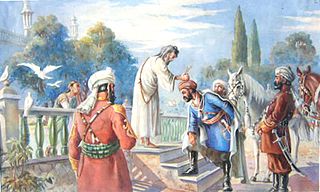
Pashtuns, also known as Pakhtuns, or Pathans, are a nomadic, pastoral, eastern Iranic ethnic group primarily residing in northwestern Pakistan and southern and eastern Afghanistan. They historically were also referred to as Afghans until 1964 after the term's meaning had become a demonym for members of all ethnic groups in Afghanistan.

Pashtunistan or Pakhtunistan is a historical region on the crossroads of Central and South Asia, located on the Iranian Plateau, inhabited by the Pashtun people of southern and eastern Afghanistan and northwestern Pakistan, wherein Pashtun culture, the Pashto language, and identity have been based. Alternative names historically used for the region include Pashtūnkhwā or Pakhtūnkhwā (پښتونخوا), Pathānistān, or simply the Pashtun Belt.

Pashto is an Eastern Iranian language in the Indo-European language family, natively spoken in northwestern Pakistan and southern and eastern Afghanistan. It has official status in Afghanistan and the Pakistani province of Khyber Pakhtunkhwa. It is known in historical Persian literature as Afghani.

The Kakar is a Gharghashti Pashtun tribe, based in Afghanistan, parts of Iran, and northern Balochistan in Pakistan.
The Mohmand or Momand is a prominent tribe of Pashtun people.

The Durrānī, formerly known as Abdālī (ابدالي), are one of the largest tribes of Pashtuns. Their traditional homeland is in southern Afghanistan, straddling into Toba Achakzai in Balochistan, Pakistan, but they are also settled in other parts of Afghanistan and parts of Khyber Pakhtunkhwa.

Qais Abdur Rashīd or Qais Abdul Rasheed is said to be, in post-Islamic lore, the legendary founding father of the Pashtuns. It is believed that the conception of such a figure was promoted to bring harmony between religious and ethnic identities post-Arabic influence over the region. Qais Abdur Rashid is said to have traveled to Mecca and Medina in Arabia during the early days of Islam and converted. But contrary to this legend, Islam spread through Afghanistan over a period of time.

The Pashto media includes Pashto literature, Pashto-language newspapers, magazines, television and radio stations, as well as Pashto films and Pashto internet. Pashto media involves the Pashtuns of Pakistan, Afghanistan and the Pashtun diaspora around the world.

Pashto literature refers to literature and poetry in Pashto language. The history of Pashto literature spreads over five thousands years having its roots in the oral tradition of Tappa. However, the first recorded period begins in 7th century with Amir Kror Suri. Later, Pir Roshan (1526–1574), who founded his own Sufi school of thoughts and began to preach his beliefs. He gave Pashto prose and poetry a new and powerful tone with a rich literary legacy. Khair-ul-Bayan, oft-quoted and bitterly criticized thesis, is most probably the first book on Sufism in Pashto literature. Among his disciples are some of the most distinguished poets, writers, scholars and sufis, like Arzani, Mukhlis, Mirza Khan Ansari, Daulat and Wasil, whose poetic works are well preserved. Akhund Darweza (1533–1615), a popular religious leader and scholar gave a powerful counterblast to Bayazid’s movement in the shape of Makhzanul Islam. He and his disciples have enriched the Pashto language and literature by writing several books of prose.
The Ghoryakhel is a Pashtun sub-tribe.

Alakozai is a Pashtun tribe in Afghanistan. They are one of the four tribes of the Zirak tribal confederacy of Durrani Pashtuns.
Karlāṇī or Karrani is a Pashtun tribal confederacy. They primarily inhabit the FATA region of Khyber Pakhtunkhwa province of Pakistan and certain parts of eastern Afghanistan. In the 16th century the Karlani founded the Karrani dynasty, the last dynasty to rule the Bengal Sultanate.

Abdul-Hai Habibi was a prominent Afghan historian for much of his lifetime as well as a member of the National Assembly of Afghanistan during the reign of King Zahir Shah. A Pashtun nationalist from Kakar tribe of Kandahar, Afghanistan, he began as a young teacher who made his way up to become a writer, scholar, politician and Dean of Faculty of Literature at Kabul University. He is the author of over 100 books but is best known for editing Pata Khazana, an old Pashto language manuscript that he claimed to have discovered in 1944; but the academic community does not unanimously agree upon its genuineness.

Pata Khazāna is the title of a manuscript written in the Pashto language. According to its discoverer, the script contains an anthology of Pashto poetry, which precedes the earliest known works of Pashto literature by hundreds of years.
Mandesh is the historical name by which the mountain region of Ghor was called.
Nāzo Tokhī, commonly known as Nāzo Anā, was an Afghan poet and writer in the Pashto language. Mother of the famous early-18th century Afghan king Mirwais Hotak, she grew up in an influential family in the Kandahar region. She is remembered as a brave woman warrior in Afghan history and as the "Mother of the Afghan Nation".
Suri is both a surname and a given name originated from Suri Dynasty’s ruler Sher Shah Suri and the Suri represent themselves as descendants of Muhammad Suri, one of the princes of house of the Ghorian. Notable people with the name include:
This page is based on this
Wikipedia article Text is available under the
CC BY-SA 4.0 license; additional terms may apply.
Images, videos and audio are available under their respective licenses.









